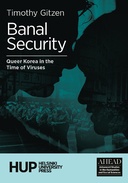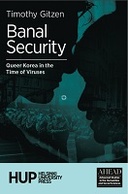Explore

The decades-long fear of South Korean national destruction has routinized national security and the sense of threat. In present day South Korea, national security includes not only war and the military, but national unity, public health, and the family. As a result, queer Koreans have become a target as their bodies are thought to harbor deadly viruses and are thus seen as carriers of diseases. The prevailing narrative already sees being queer as a threat to traditional family and marriage. By claiming that queer Koreans disrupt military readiness and unit cohesion, that threat is extended to the entire population. Queer Koreans are enveloped by the banality of security, treated as threats, while also being overlooked as part of the nation.
What does it mean to be perceived as a national threat simply based on who you would like to sleep with? In their desire to be seen as citizens who support the safety and security of the nation, queer Koreans placate a patriarchal and national authority that is responsible for their continued marginalization. At the same time, they are also creating spaces to protect themselves from the security measures and technologies directed against them. Taking readers from police stations and the galleries of the Constitutional Court to queer activist offices and pride festivals, Banal Security explores how queer Koreans participate in their own securitization, demonstrates how security weaves through daily life in ways that oppress queer Koreans, and highlights the work of queer activists to address that oppression. In doing so, queer Koreans challenge not only the contours of national security in South Korea, but global entanglements of security.
Timothy Gitzen is an Assistant Professor of Anthropology at Wake Forest University.
"Rich in ethnographic and interpretive texture, Banal Security challenges the deep-seated division between ideas about national security and attitudes toward sexuality. Using Korea’s viral genealogies as a window into the geopolitics of queer Asia, Gitzen’s study masterfully exceeds the theoretical limitations of homonationalism and forges new analytics around the fabrics of queer life. At once a rethinking of familiar turning points, such as the 2015 Korean Queer Cultural Festival, and an astute observation of emergent trends, including the co-imbrication of Islamophobia and homophobia, this book sets a new benchmark for cultural anthropology and the study of health epistemology, social alienation, and sexual citizenship."
Howard Chiang, Lai Ho and Wu Cho-liu Endowed Chair in Taiwan Cultural Studies, University of California, Santa Barbara
This book is included in DOAB.
Why read this book? Have your say.
You must be logged in to comment.
Rights Information
Are you the author or publisher of this work? If so, you can claim it as yours by registering as an Unglue.it rights holder.Downloads
- 55 - pdf (None) at Google Books.
- 70 - pdf (CC BY-NC-ND) at Unglue.it.
- 87 - epub (CC BY-NC-ND) at Unglue.it.
Keywords
- anthropology
- Discrimination
- East & Southeast Asian languages
- Economics
- Economics, finance, business & management
- Gender studies, gender groups
- Gender studies: women
- International economics
- Language qualifiers
- LGBTQ+ rights
- National security
- Political Science & Theory
- Politics & government
- Queer Activism
- Security measures
- Social groups
- Society & culture: general
- Society & Social Sciences
- Sociology
- Sociology & anthropology
- South Korea
- thema EDItEUR::2 Language qualifiers::2G East and Southeast Asian languages
- thema EDItEUR::J Society and Social Sciences::JB Society and culture: general::JBS Social groups, communities and identities::JBSF Gender studies, gender groups::JBSF1 Gender studies: women and girls
- thema EDItEUR::J Society and Social Sciences::JH Sociology and anthropology::JHB Sociology
- thema EDItEUR::J Society and Social Sciences::JH Sociology and anthropology::JHM Anthropology
- thema EDItEUR::J Society and Social Sciences::JP Politics and government::JPA Political science and theory
- thema EDItEUR::K Economics, Finance, Business and Management::KC Economics::KCL International economics
Links
DOI: 10.33134/AHEAD-3web: http://www.hup.fi/site/books/m/10.33134/AHEAD-3/
Editions




